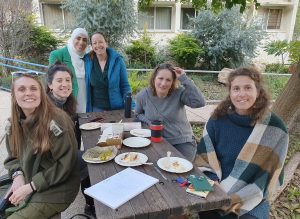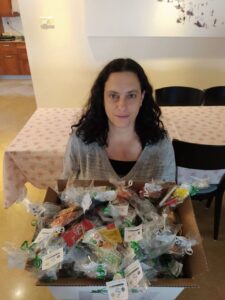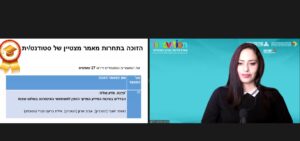Celebrating together Soryna’s Ph.D. seminar and (finally!) the beginning of the winter semester at the Technion. Yael, keep safe!

Celebrating together Soryna’s Ph.D. seminar and (finally!) the beginning of the winter semester at the Technion. Yael, keep safe!

Read the fantastic blogpost by Dr. Lea Taragin-Zeller describing our new paper “We think this way as a society!”: Community-level science literacy among ultra-Orthodox Jews.
It was worth doing this research just to get her to write this post!
https://sagepus.blogspot.com/2022/10/who-needs-community-level-science.html
We are often told that nowadays, all the world’s knowledge is available at our fingertips – just a quick Google search away. But what happens when users search for information in their own language? For example, when searching for a scientific term, do search engines provide English-, Hebrew- and Arabic-speaking students with the same level of access to quality scientific information? This question is addressed by a new study, conducted at the Technion and recently published in Public Understanding of Science.
The study found that search results for terms in English are of better quality than those provided for equivalent terms in Hebrew and Arabic. Additionally, most of the differences between the languages pertained to pedagogical aspects of quality, that is, the extent to which the content was geared towards young users, rather than the scientific aspects, such as the accuracy of the content. Some of the largest differences between the languages were found for terms related to nutrition and metabolism, such as “carbohydrate,” “protein,” “enzyme” and “metabolism.”
These findings are based on the top Google Search results presented to users in Israel for 30 basic scientific terms in three languages: Hebrew, Arabic and English. The terms pertained to three scientific domains: biology, chemistry, and physics. Each search result’s overall quality was determined using scientific criteria, such as content accuracy, the author’s authority, and the use of sources; pedagogical criteria, such as references to everyday life and the quality of audiovisual materials; and criteria specific to online content, such as recency and interactivity.
According to Kawther Zoubi, who conducted the study as part of her masters’ thesis at the Technion’s Faculty of Education in Science and Technology, “these findings help us understand the digital divide and the social factors that affect our ability to develop science literacy. Our understanding of science depends on the environment we live in and the extent to which we have access to quality scientific information. This depends on our proficiency in different languages.”
Prof. Ayelet Baram-Tsabari of the Technion’s Faculty of Education in Science and Technology, who oversaw the study, added: “The scientific and educational communities must act to mitigate the digital divide. We all have the right to access quality scientific information in our language.”
The study was conducted by Kawther Zoubi, Dr. Aviv Sharon, and Prof. Ayelet Baram-Tsabari of the Technion’s Faculty of Education in Science and Technology, along with independent scholar Dr. Eyal Nitzany.
The study is available under an Open Access license (CC BY-NC 4.0) from Public Understanding of Science, published by SAGE Journals.
Zoubi, K., Sharon, A. J., Nitzany, E., & Baram-Tsabari, A. (2021). Science, maddá and ‘ilm: The language divide in scientific information available to internet users. Public Understanding of Science. Advance online publication. https://doi.org/10.1177/09636625211022975
Accompanying video: https://youtu.be/ZYTlIdUWxss

בפורים יצאנו מאפלה לאור גדול, ו”הופכות את היוצרות” מנסות לעשות את אותו הדבר עבור שורדות זנות.
בזכות קרן הפכנו שותפים למשלוחי מנות לנשים בהוסטלים ולילדיהן. מוזמנים להשתתף גם:
https://www.yotsrot.org/ for women exiting life in prostitution and sex trafficing
On Purim we came out of darkness into a great light, and “Yotsrot – Turning the Tables” try to do the same for survivors of prostitution.
Thanks to Keren, we have become partners in parcel deliveries for women in hostels and their children. You are also welcome to participate: https://www.yotsrot.org/

מאמרה של בוגרת הפקולטה כאותר זועבי זכה היום בפרס מאמר מצטיין של סטודנט/ית בכנס צ’ייס 2021. המאמר “סַיְיֵנְס, מַדָּע וְעִלְם: הבדלים באיכות המידע המדעי הזמין למשתמשי האינטרנט בשלוש שפות” נכתב על ידי כאותר זועבי , ד”ר אביב שרון , ד”ר אייל ניצני, ופרופ’-חבר אילת ברעם-צברי בהתבסס על עבודת המאסטר של כאותר. גאים בך כאותר!
This was the longest pregnancy I had for a paper (or a person for that matter). It was written, and revised, forgotten, and resurrected over the last decade with Dr. Esthi Laslo. The reason I have not dropped it is because I believe it is a strong and important research that carries an important message for science education. Finally – it’s here, and I’m happy to share it with you. I have 50 free copies, come and get yours:
https://www.tandfonline.com/eprint/47WNHGFWSUJSEZTKUG8U/full?target=10.1080/21548455.2020.1871103
(2021) Expressions of science literacy in online public discussions of animal experimentation, International Journal of Science Education, Part B, DOI: 10.1080/21548455.2020.1871103
In the unlikely event that you missed the SciComm Research Field Analysis Webinar with Prof. Alexander Gerber, Prof. Emily Dawson , Prof. Bruce Lewenstein, and Prof. Ayelet Baram-Tsabari on Jan. 18th 2021, you can now watch it here:
https://www.youtube.com/watch?v=PW2O-lUs__U&feature=youtu.be
Gil Markovitz and Ayelet Baram-Tsabari on Kan public radio podcast series! The new podcast by “The Lab” (Hama’abada) invites you for a journey in five chapters through science communication research: https://www.kan.org.il/Podcast/program.aspx?progId=2025&subcatid=486
Our new paper just out in the Science Communication special issue on COVID-19! Also featured on the Communication Initiative website, if you prefer the shorter version… Applause to Dr. Lea Taragin-Zeller and Masters student Yael Rozenblum for a fabulous academic job done on a journalistic timescale.
The mega-book “Communicating Science: a global perspective” is published! 39 countries, 108 authors, including our own Israeli chapter: Developed Science, Developing Science Communication. Hope you’ll enjoy reading it, as much as we enjoyed writing it.
The PCST webinar launching the book: Communicating Science: a global perspective now available for your viewing pleasure: https://pcst.co/news/article/92. It was a great webinar – do watch.
AND – You can download the book for free from ANU Press: https://press.anu.edu.au/publications/communicating-science
Baram‑Tsabari, A., Orr, D., Baer, A., Garty, E., Golumbic, Y., Halevy, M., Krein, E., Levi, A., Leviatan, N., Lipman, N. and Mir, R., 2020. Developed Science, developing Science Communication. Communicating Science: A Global Perspective, p.443.